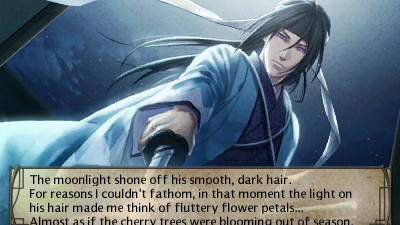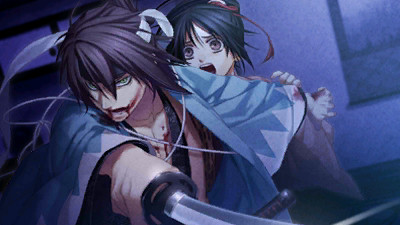Here at Everybody Plays, there's nothing we like better about our games than a good story. Whether it's the tale of the struggles of a girl born linked to a mysterious force from another dimension, the story of a novelist searching for his lost wife amidst shadows, or the moral conflict and conundrums of a dystopian underwater city, games can be as powerful a medium for storytelling as your average film or book - but not all are created equal. While some have stories designed to provide a balance to the action - a reason to get from A to B - others prefer to almost forego the plot altogether in an attempt to let you start shooting things in the face quicker. But what happens when the pendulum swings so far to the story end that there's little to do but read? Hakuoki: Memories of the Shinsengumi happens, that's what.

And in traditional Japanese style, all the guys look a bit feminine.
Essentially an interactive chose-your-own-adventure novel set in 1860s Japan, Hakuoki takes place in a land of samurais and political turmoil, with the story beginning as the young, and nervous Chizuro Yukimura steps out onto the dangerous streets of Kyoto alone. Worried about her missing father, but concerned about drawing unwanted attention as a lone female in a bad part of town, she disguises herself as a boy and sets out to the home of her father's friend, Dr. Matsumoto, who she hopes might have some idea of her father's whereabouts. Unfortunately, it turns out Dr. Matsumoto's away on business - and soon, night begins to fall. No sooner has the sun set than things begin to get violent, as Chizuro finds herself witness to a frightening attack on a group of rogue ronin - disgraced samuaris who've turned to crime to fund their existence - by another group of deranged, blood-thirsty samurais, known as furies, who hack the ronin into a rather grisly and bloody pulp. Rescued by a couple of members of the Shinsengumi, a special police-style force who help keep Kyoto safe, Chizuro soon becomes their unwilling house guest, as having borne witness to an event that was much more significant than she realises, she knows too much to be let loose. Held captive in their headquarters, before coming down with a serious case of Stockholm Syndrome for her captors along the way, the stage is set for a feudal mystery that takes in the paranormal, a little bit of history, and a fair amount of romance.
You see, Hakuoki belongs to a very specific genre of games known as 'otome' in Japan, which are targeted squarely at female players. With a female protagonist and a number of eligible bachelors to choose from, your decisions throughout the story will steer you on course to romance one of the guys, often with very distinct endings for each of the characters. Memories of the Shinsengumi has five (plus a sixth secret) blokes to choose from, each with their own personalities - from the serious commander and 'mother hen' of the group Hijikata, to the sarcastic and sadistic Okita, to the quietly intelligent and mysterious Saito. The remaining, more down-to-earth pair are perhaps our favourites, with the all round nice guy Harada edging ahead of the young and innocent joker Toudou. Each of the chappies is unique and memorable, and you learn more about each one as the game's eight chapters unfold by accompanying the captains on patrols and raids, chatting to them between missions, and of course having them save you from being kidnapped, being the chivalrous samurais they are. While each of their stories are well worth seeing (even the depressing bad endings), we can't help feeling that a couple of the main Shinsengumi characters seem conspicuous from the options by their absence, and we're not sure why - particularly Harada and Toudou's partner in crime Nagakura.

Okita in one of those rare moments where he's NOT threatening to kill you...
As a "visual novel" style game, it stands to reason that there's not really all that much in the way of interactivity here - instead, you'll be reading through pages and pages of story and dialogue, with the odd conversation option to choose from here and there. So it's just as well that Memories of the Shinsengumi is an engrossing tale, with plenty of twists and turns, betrayals and back-stabbings along the way - it's not just well-written for a game, but well-written full stop. The story itself branches out too, depending on the options you pick at certain points, meaning you'll most likely have to complete several playthroughs before you get the complete picture - and experience all the possible romantic outcomes. Perhaps the only real sticking point is that the setting is pretty foreign to Western audiences - fortunately, Hakuoki explains all the lingo in it's built-in encyclopedia, which expands as the story goes on, so what would have been an impenetrable wall of Japanese feudal history ends up at least making some sense. And as a bonus, you may find yourself walking away with a better knowledge of the history of that period too, seeing as it's all based on the battles that actually took place in ancient Japan (and the characters were all real people too).
Technically speaking, Memories of the Shinsengumi is an enhanced port of the PSP game Hakuoki: Demon of the Fleeting Blossom, which never made it over to the UK (unless you imported from America) - and as such, the main game is pretty much identical to what came before. The 'six new stories' the box boasts are short 10-15 minute 'chapters' that recount some of the main events from the story, told through the eyes of each of the bachelors, filling in some of the gaps and giving you a bit more of an insight into their thoughts and feelings. There's also a photo booth mode where you can snap pics of yourself (or in our case a cuddly Wario and our cat) beside the Shinsengumi guys and decorate them with sparkles and stickers - even if it is a fairly forgettable feature compared to the rest of the game, it's still a pretty fun distraction while it lasts.

Wario hanging with my homies.
A romantic novel dressed up as a game may be out of the comfort zone of some players, but those who give Hakuoki: Memories of the Shinsengumi a go will find an enthralling story that's as much about war, bloody betrayals and political conflict as it is about love, friendship and pretty guys. It's slow pace may not be to everyone's taste, but those who've enjoyed similar style games such as Phoenix Wright or Virtue's Last Reward (or even Otomate's other games, such as the PSP's Sweet Fuse: At Your Side) should be right at home here.
Format Reviewed: Nintendo 3DS




















